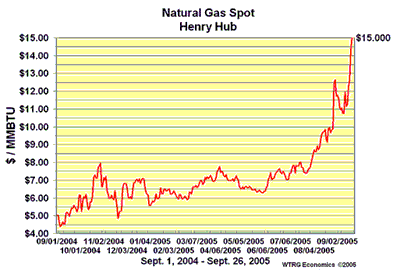Energy Crisis? Wait for the heating bill
Posted By RichC on September 28, 2005
 There has been a fair amount of discussion racing around the media in regard to where the world sits in relation to the amount of fossil fuel is left … as well as what impact our burning it has on global warming. I doubt anyone has the ability to predict ‘Peak Oil‘, let alone the repercussion of using fossil fuels in regard to global warming? Nevertheless, the debates and information available from them is interesting.
There has been a fair amount of discussion racing around the media in regard to where the world sits in relation to the amount of fossil fuel is left … as well as what impact our burning it has on global warming. I doubt anyone has the ability to predict ‘Peak Oil‘, let alone the repercussion of using fossil fuels in regard to global warming? Nevertheless, the debates and information available from them is interesting.
What we do know is that recent hurricanes, Katrina and Rita, along with increased worldwide demand on crude oil has rapidly increased prices and concern over shortages. I couple of recent economic numbers have reflected interestingly as to the short term for fossil fuels. (and most likely will be refective in prices for alternatives) Just days after Rita came ashore and disabled (at least in the short term) a quarter of our nation’s refining capacity, a report was out that gasoline inventories were up 4.4 million barrels. At first look … this is good news, but unfortunately what this surplus refected was the increase imports the US received after Katrina. More than likely this surplus is already gone. Prepare for higher fuel prices and potential shortages as companies work to get refineries up and running again.

A second crisis, that of shortages of natural gas, has yet to hit our citizens; for many of us it will not be noticed until the heating bills start to arrive. Last winter 50% of all US homes heated with natural gas and we all have already experienced substantially higher prices than in previous years. This year it is estimated that we will see bills 50% higher than last year!
Analysts are saying that this potentially loss of natural gas production in the Gulf of Mexico will continue to drive up prices. A real concern is what we don’t know in regards to natural gas infrastruture damage. For example, Katrina caused significant damage to Royal Dutch Shell PLC’s Mars platform, which produces around 250,000 barrels a day of crude oil and 365 million cubic feet of gas a day; about 40 other platforms were also damaged significantly, though they were smaller facilities.
“By Tuesday, more than 4 billion cubic feet a day, or 42 percent, of the region’s natural gas production remained shut down and 67.6 billion cubic feet of output has been lost since Aug. 26,” according to the federal Minerals Management Service.
This time of year most utility companies usually are increasing their underground storage of natural gas in order to prepare for winter demand. Unlike the Strategic Petroleum Reserves, the U.S. does not have an emergency stockpile of natural gas so the pain could be very real.
One energy expert was quoted to say that”Natural gas is the one commodity here that I have very little to say about in the way of good news.” On Tuesday, natural gas futures slipped 3.4 cents to settle at $11.657 per 1,000 cubic feet. A year ago natural gas futures traded below $5. One forecasting model for an energy trading company has shown the potential for $15 per 1,000 cubic feet of natural gas if there is any additional significant damage to underwater pipeline in the Gulf of Mexico.
Quite the change … perhaps it might be a good idea to insulate and caulk a few windows and doors, wrap your pipes and pick up a couple of portable alternative heaters?
Comments